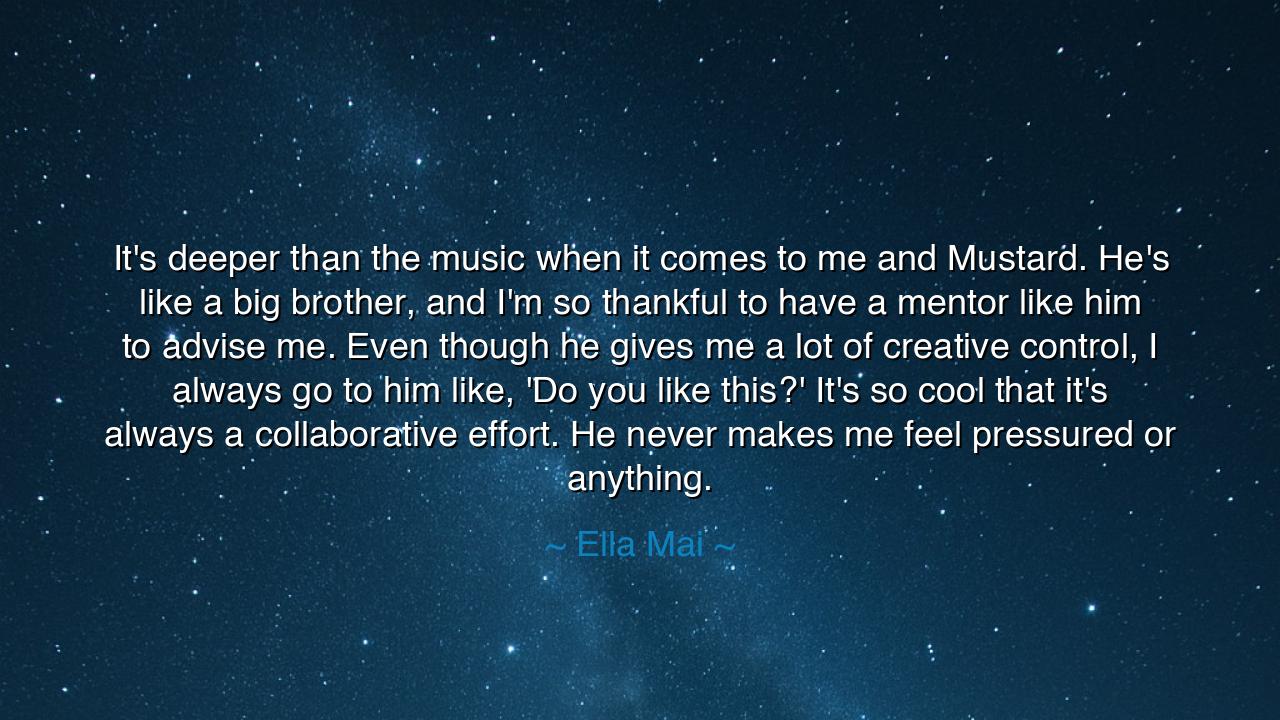
It's deeper than the music when it comes to me and Mustard. He's
It's deeper than the music when it comes to me and Mustard. He's like a big brother, and I'm so thankful to have a mentor like him to advise me. Even though he gives me a lot of creative control, I always go to him like, 'Do you like this?' It's so cool that it's always a collaborative effort. He never makes me feel pressured or anything.






In the words of Ella Mai, we hear a truth that stretches beyond the stage, beyond the song, and into the eternal rhythm of human companionship: “It’s deeper than the music when it comes to me and Mustard. He’s like a big brother, and I’m so thankful to have a mentor like him to advise me. Even though he gives me a lot of creative control, I always go to him like, ‘Do you like this?’ It’s so cool that it’s always a collaborative effort. He never makes me feel pressured or anything.” Here the voice of gratitude speaks not merely of melody, but of mentorship, trust, and the sacred art of collaboration.
The bond between artist and guide, between apprentice and elder, is among the oldest relationships of humankind. Just as the ancient sculptor’s apprentice learned to strike marble with wisdom from the master’s hand, so too does Ella Mai describe her relationship with Mustard as one that is “deeper than the music.” For in him she finds not only technical counsel, but the presence of a big brother, one who shields as much as he instructs, who advises as much as he empowers. This is not mere partnership, but kinship born in the fires of creation.
We see in her words the beauty of balance—that the mentor does not command nor suppress, but offers creative control while still serving as anchor and compass. Such balance recalls the tale of Aristotle and Alexander the Great. Aristotle gave the young Alexander the tools of thought, but never sought to dictate the king’s every choice. Instead, he guided, advised, and trusted him to wield his power wisely. And Alexander, though a conqueror of lands, returned often to seek the counsel of his teacher. The greatness of his empire was not born in solitude, but in dialogue between mentor and student.
Ella Mai’s gratitude also reveals the freedom of an environment where there is no pressure. For what grows under coercion? Only fear, hesitation, and resentment. But what flourishes under encouragement? Innovation, courage, and joy. Mustard, by refusing to make her feel bound, has given her the soil in which her artistry may bloom fully. And this, too, is a timeless truth: the greatest leaders and mentors do not bend their protégés to their own shape, but allow them to unfold in their own.
Yet her humility shines as brightly as her mentor’s wisdom. Even with the reins of creative control in her hands, she still turns and asks: “Do you like this?” This is not weakness, but reverence—the recognition that wisdom grows richer when shared. It is the understanding that true creation is not a solitary act, but a collaborative effort. The ancient bards of Greece knew this well: even Homer sang not alone, but as the voice of a tradition carried and refined across generations.
From this quote we must draw a lesson: that the road to mastery is not walked alone. Seek mentors, those who will not only teach, but also empower you, those who will not only guide, but also stand beside you as family. And when such a mentor is found, honor them, not by blind obedience, but by mutual trust, by bringing your own strength into the bond. For greatness is not merely taught—it is shared, shaped by many hands.
Practically, this teaching calls us to act. Find those in your life who can serve as wise voices, and approach them with humility and gratitude. Offer your work to their eyes, not out of fear, but out of desire to refine and grow. And if you yourself are in the place of a mentor, emulate Mustard: do not command, but empower. Create a space where pressure gives way to trust, where fear gives way to freedom. In so doing, you pass down not only knowledge, but also strength of spirit.
Thus the wisdom of Ella Mai’s words endures. It is not only about music, but about the deeper harmony of human bonds—mentor and student, brother and sister, guide and creator. This harmony teaches us that no art, no life, no destiny is built alone. It is in the union of hearts, in the collaboration of minds, that the most enduring songs of humanity are composed.






AAdministratorAdministrator
Welcome, honored guests. Please leave a comment, we will respond soon